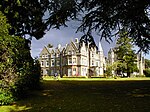Beaumont College
Beaumont College was between 1861 and 1967 a public school in Old Windsor in Berkshire. Founded and run by the Society of Jesus, it offered a Roman Catholic public school education in rural surroundings, while lying, like the neighbouring Eton College, within easy reach of London. It was therefore for many professional Catholics with school-age children a choice preferable to Stonyhurst College, the longer-standing Jesuit public school in North Lancashire. After the college's closure in 1967 the property was used in turn as a training centre, a conference centre and an hôtel; St John's Beaumont, the college's preparatory school for boys aged 3–13, continues, functioning in part as a feeder school for Stonyhurst.
Excerpt from the Wikipedia article Beaumont College (License: CC BY-SA 3.0, Authors).Beaumont College
Burfield Road,
Geographical coordinates (GPS) Address Nearby Places Show on map
Geographical coordinates (GPS)
| Latitude | Longitude |
|---|---|
| N 51.449 ° | E -0.575 ° |
Address
Burfield Road
SL4 2SJ
England, United Kingdom
Open on Google Maps








